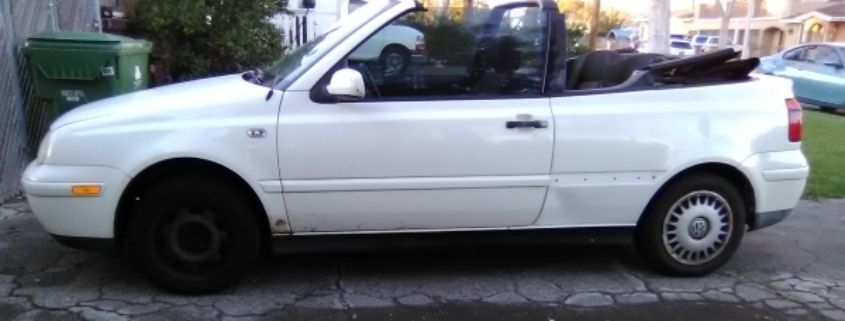Los Angeles in the Rain
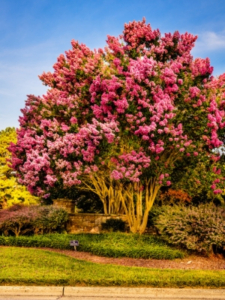 My car’s having problems, again, so I’ve been taking the bus and train to work. Walking to the bus stop each morning, I pass the U-Haul place, which is always populated by Latino men, young and old, talking and waiting. Across the street at the bus stop, I stand to one side and observe street life on Lankershim Boulevard. One morning, I’m standing half a block up from the bus stop, smoking as I wait for the bus. I spot a youngish white man walking up the street—not the sidewalk—toward me. He swings his fists and shouts at the air, legs rigid as he throws his feet forward over and over. He spots me and crosses the street against traffic. I shove my lighter in my pocket and sidle as quickly as possible back to the safety of the bus bench. He passes me by and continues up the street, jerking and screaming. I wonder where he came from, and where he’s going, and what he’s so angry about.
My car’s having problems, again, so I’ve been taking the bus and train to work. Walking to the bus stop each morning, I pass the U-Haul place, which is always populated by Latino men, young and old, talking and waiting. Across the street at the bus stop, I stand to one side and observe street life on Lankershim Boulevard. One morning, I’m standing half a block up from the bus stop, smoking as I wait for the bus. I spot a youngish white man walking up the street—not the sidewalk—toward me. He swings his fists and shouts at the air, legs rigid as he throws his feet forward over and over. He spots me and crosses the street against traffic. I shove my lighter in my pocket and sidle as quickly as possible back to the safety of the bus bench. He passes me by and continues up the street, jerking and screaming. I wonder where he came from, and where he’s going, and what he’s so angry about.
Beautiful isn’t a sufficient word. Los Angeles is skies of purple, orange, blue, and yellow. It’s bearded palm trees and pink and white pale-bark crape myrtles. Lonesome skyscrapers and homely houses, sweltering valley and chilly coast, alt rock bands and hip-hop dancers. Los Angeles is the subway below and airplanes above. But in the rain, my city feels scuzzy. All the filth and sorrow that’s been pounded into the streets for most of the year becomes slick and muddy as the clouds release their drizzles and torrents. Still, the visual of the rain in the city can be astounding: the asphalt reflects the green-yellow-red cycle of the stoplight, its colors stretching out for blocks; the firetruck tears down the street toward a wreck, its red lights pulsing against the looming buildings; the sun breaks through the grey-black clouds, its focused beams catching the still-falling raindrops and casting a rainbow across the sky. We’re not used to it here. We marvel at weather, necks craned skyward as we wonder whether the snow in the mountains is a sign of climate change, of coming drought.
When it rains in L.A., there are two types of people: those who dust off the umbrellas and rainboots that spend most of the year in the back of a closet, and those who rely on layers of flannels and coats and the same old sneakers that inevitably become soaked as the sidewalks flood.
* * *
At the North Hollywood Station, there are grates over a large portion of the sidewalk. The air blowing up from the trains below is slightly warmer than the chilly wind, so people pitch their tents on top of the grates. As I walk by, I try not to look, and I try not to look away. A woman sitting on a bus bench wrapped in a red sleeping bag says, “Hey,” to me as I pass. I stop and turn. She points across the street. “I think they’re selling coffee for a dollar.” I reach into my pocket and take out a dollar I can’t afford to spend and hand it to her. She looks cold. I’m glad she has a blanket.
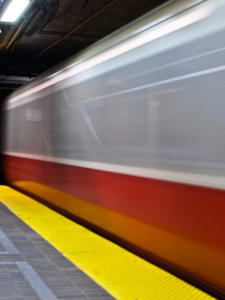 My entire family has a soft spot for people who are down on their luck. My brother carries spare bottles of water to pass out to street people on hot days. I try not to keep cash in my pockets because it flows from my hands and leaves me wondering where all my lunch money went. My parents come from the backwoods of South Carolina, where people lived off the land and the charity of their churches. I don’t remember a time before I knew we were poor. I wore hand-me-downs and reread all my books a hundred times and accepted that there were things I would never have. I can’t help but see myself as adjacent to the population of people scrounging an existence from the streets and the trash of those who are better off. Finances are always tenuous, and the possibility of being on the street is always a looming terror. On tough days, I find myself eyeing soft-looking patches of dirt underneath bushes, or niches in alleys hidden from view of the street, wondering if I could spend a night there. On better days, I wonder who would take my cat in if I had to live in my car. I’ve been lucky, relying on my family and friends to help me when things spiral out of control and I can’t afford something vital.
My entire family has a soft spot for people who are down on their luck. My brother carries spare bottles of water to pass out to street people on hot days. I try not to keep cash in my pockets because it flows from my hands and leaves me wondering where all my lunch money went. My parents come from the backwoods of South Carolina, where people lived off the land and the charity of their churches. I don’t remember a time before I knew we were poor. I wore hand-me-downs and reread all my books a hundred times and accepted that there were things I would never have. I can’t help but see myself as adjacent to the population of people scrounging an existence from the streets and the trash of those who are better off. Finances are always tenuous, and the possibility of being on the street is always a looming terror. On tough days, I find myself eyeing soft-looking patches of dirt underneath bushes, or niches in alleys hidden from view of the street, wondering if I could spend a night there. On better days, I wonder who would take my cat in if I had to live in my car. I’ve been lucky, relying on my family and friends to help me when things spiral out of control and I can’t afford something vital.
Heading downtown, I’m trapped in a subway car with the suffocating smell of unwashed human. A black man stands in the center of the car, holding on to a pole. He’s slipped off his shoes, and his feet look painful. I blow air out of my nostrils and try to concentrate on my book. He rides the train for three or four stops, then shuffles off the train onto the platform. Another man, also black, says to the car at large, “The government’s doing that to us, you know.” Blank white faces look uncomfortably away, pretending to be absorbed in cell phones with no reception. I want him to say more, to bring attention to the dire situation pressed against our eyes, to make these other people think about something other than the lingering smell of a human body. He doesn’t say anything else.
* * *
My parents met in a trailer park, and they left South Carolina together, eventually ending up 3,000 miles away from home. They arrived in Los Angeles in 1987 with two young children in tow and took jobs as paralegals.
“We hustled our asses off,” my mom says, recalling days as a notary public and process server and nights of cleaning the law office building top to bottom.
Three years later, I came along, and we moved into a yellow, four-bedroom house in Van Nuys. For a time, my parents inhabited their dream, working hard and raising their children in the ideal, iconic city, opportunity lurking around every corner. Even after they split and my mom married my stepfather, I lived a life surrounded by glamour, diversity, and color. When I was little, we went to the beach all summer, threw ourselves against the waves of the Pacific, caught and cradled sand crabs in our palms. The sun shone long into the school year, warming our faces and arms—until the grey overtook the sky and rain made it so wet we had to tie plastic Ralph’s bags over our shoes.
My mom once befriended a man who lived in the Ralph’s parking lot, Russell.
“We were pals,” she says.
When she heard that Russell and his wife Janet spent their time in their tent playing cards by candlelight, she put together a package of candles and decks of cards and presented it to the homeless couple for Christmas, along with a new jacket for Russell. He and my mom cried together, gratitude and compassion mingling in the tears of two humans who cared about each other.
* * *
In the early morning, a young woman gets on the train at the North Hollywood Station. She is dressed in black leggings and a black top with a swirly red skirt. She is barefoot. Loud, desperate, alone, her voice rises above the noise of the train: “Can anyone help with spare change, if you would?” On another day, “Could anyone help with spare change besides the black guy who’s—” Did she say “who’s dead?” Her smell is overwhelming and her feet look awful and her hair is short and thinning. When I hand her a dollar, no eye contact, she says, “Thank you, my love.” Her words pierce the middle of my chest and wriggle inside, and they reside there beside the pain that comes when I’m off my meds and always near tears. Eyes on screens, headphones in, hoods up—no one looks at us. I wonder how much money she makes doing this every day. She gets off at the next stop and hops on the next car, her reedy voice ringing out again to beg.
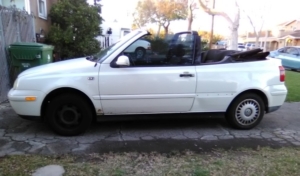 I finally took my car in for repairs, expensive but so worth it. After more than a month, moving under my own power again is intoxicating, foreign. The rain has abated a bit, allowing me to put the top down and scrub the mold out of my flooded backseat. Water has gotten into the door, and now the window is stuck, but I’m not even mad about it. I’m grateful for my janky car, more than I’ve ever been. I’m safe again, protected, independent.
I finally took my car in for repairs, expensive but so worth it. After more than a month, moving under my own power again is intoxicating, foreign. The rain has abated a bit, allowing me to put the top down and scrub the mold out of my flooded backseat. Water has gotten into the door, and now the window is stuck, but I’m not even mad about it. I’m grateful for my janky car, more than I’ve ever been. I’m safe again, protected, independent.
Still, I don’t think I’ll be able to return to my bubble. I feel powerless. Within me, the need to act has been awakened. I can’t help but think of how much I have relative to those who can’t even afford a room to rest their head. I also can’t help but think how futile it feels to try to chip away at the problem of homelessness a dollar bill at a time, like trying to dig a tunnel in a mountain with a toothpick. While I believe putting cash into the hands of the people who need it is usually the best course of action, isn’t there something else we can do, something bigger and more impactful?
* * *
Today, while I was walking to pick up my car, I passed an older man with a long white beard, carrying a small dog under his arm.
“Hello there!” he said, not looking at me. There was no one else nearby.
“Hello,” I replied, slowing. I knew he would call me back, and he did. He explained that he hated to come to me asking like this, but he and his puppy needed help with food. He invited me to scratch the adorable thing under the chin. It was a cutie, very little, but I didn’t hand over three bucks for the pup. It was for the man who didn’t expect me to reply to him when he greeted me, who was embarrassed to ask for help. He appreciated it so much he hugged me, a thump on the back from him to me and me to him.
* * *
As a grad student, I’ve met a lot of outstanding people. One is my friend Stephanie Jaeger, who is a pastor here in North Hollywood at St. Matthew’s Lutheran Church. I was incredibly heartened when I learned about the church’s nonprofit: the NoHo Home Alliance. Through this community organization, Stephanie and other volunteers work to provide the local homeless population with resources, including access to bathrooms and showers, clothing, and meals. In addition, they make a safe space for recreation, supplying folks with books, games, and movies as well as charging stations for cell phones. This work not only gives dignity to those who are ignored or thrust aside, but it also mobilizes the community to address issues such as homelessness in their neighborhood. By giving residents a course of action, it benefits the homeless population while also easing the anxiety of residents, who are able to make personal connections and relationships with people experiencing homelessness. It is good work, and needed, showing the power of community.
If you would like more information about the NoHo Home Alliance, please check out their website at www.nohohome.org or follow them on social media: @nohohome.
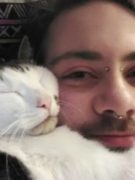 Adrien Kade Sdao writes young adult fiction and works in a children’s bookstore in Los Angeles. They are an MFA candidate at Antioch University, Los Angeles, and they are the lead editor for the Young Adult genre at Lunch Ticket. Their work has appeared in Lunch Ticket and Womanpause. They live in North Hollywood with their cat, Shelly.
Adrien Kade Sdao writes young adult fiction and works in a children’s bookstore in Los Angeles. They are an MFA candidate at Antioch University, Los Angeles, and they are the lead editor for the Young Adult genre at Lunch Ticket. Their work has appeared in Lunch Ticket and Womanpause. They live in North Hollywood with their cat, Shelly.

